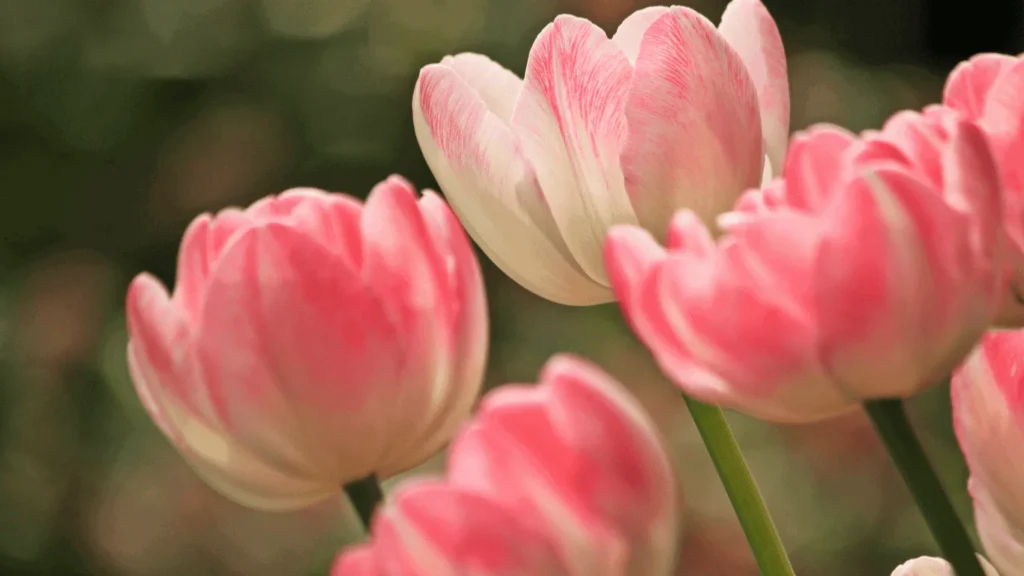Wake Forest Tulip Planting Guide for Colorful Spring Blooms

As Wake Forest’s premier landscaping company, the residential landscaping experts at Turf TitanZ are committed to enhancing the natural beauty of our community, one garden at a time.
Tulips, with their vibrant hues and elegant forms, are a favorite among garden enthusiasts for good reason. These exquisite spring-blooming flowers not only bring a burst of color to your landscape but also symbolize the arrival of a new season and the promise of warmer days ahead.
That’s why our garden professionals are taking a deep dive into the world of tulips, offering expert advice on selecting the right varieties along with planting and caring for them. Whether you’re a seasoned gardener or just starting your green journey, join us on this tulip-planting adventure, and let’s transform your Wake Forest garden into a tapestry of vibrant springtime beauty.
Why Choose Tulips?
Tulips, with their timeless charm and breathtaking beauty, have earned a special place in the hearts of gardeners around the world. Let’s explore why choosing tulips for your Wake Forest landscape is sure to satisfy with their vibrancy and artistry.
Colors, Shapes, and Varieties
When it comes to growing tulips, the possibilities seem endless. Tulip plant bulbs come in a breathtaking array of colors; from bold and fiery reds to soft pastels and everything in between, tulips offer a kaleidoscope of hues that can be tailored to your style and garden’s theme. When tulips bloom into their elegant and diverse shapes, from classic cup-shaped blossoms to fringed and parrot tulips, they add an extra layer of intrigue to your landscape.
Low Maintenance
When you grow tulips, they require minimal upkeep, making them a low-maintenance plant for your garden. Tulips are known for their ease of care, making them an excellent choice for busy homeowners. With a few easy, simple steps, you can keep your tulips flowering and flourishing with minimal effort, allowing you to enjoy their beauty without the stress of a demanding maintenance schedule.
Versatility in Garden Design
Whether you have a small urban garden or a sprawling estate, planting bulbs of tulips creates a visually pleasing atmosphere that fits any landscape. When you plant tulips in your garden they add versatility to the other grasses, plants, shrubs, and other greenery. From formal flowerbeds to naturalistic meadows, tulips grow in a way that can be integrated seamlessly into various garden styles.
Preparing Your Wake Forest Garden for Tulip Planting
Before you plant the bulbs for your tulips in your Wake Forest garden, it’s crucial to lay the groundwork for success. Our tulip planting experts are walking you through the essential steps to ensure your garden is ready to plant fresh bulbs that will flourish into beautiful spring blooms.
Assessing Your Garden
Before you start growing tulips, take a moment to assess your garden’s conditions. Not all areas may be suitable for these lovely flowers. Consider factors such as sunlight exposure, soil quality, and drainage. Tulips thrive in well-draining soil with good sun exposure.
Selecting the Right Tulip Varieties
North Carolina has a temperate climate with distinct seasons, including relatively mild winters and warm springs. Here are some tulip varieties that tend to perform well in North Carolina’s climate:
Darwin Hybrid Tulips: These tulips are known for their strong, sturdy stems and large, classic tulip-shaped flowers. They offer a wide range of colors, including vibrant reds and yellows, and are well-suited to the state’s climate.
Triumph Tulips: Triumph tulips are versatile and perform well in various climates. They come in a wide range of colors and are known for their strong stems and medium-sized blooms.
Fringed Tulips: Fringed tulips, with their delicate, fringed petal edges, can add a touch of elegance to your NC garden.
Single Early Tulips: Single early tulips are among the first to bloom in spring and can handle cooler temperatures. Varieties like ‘Red Emperor’ and ‘Apricot Beauty’ provide early-season color and adapt well to North Carolina’s conditions.
Species Tulips: Some species tulips are well-suited to North Carolina’s climate. They are smaller in size and have a natural, less formal appearance.
Botanical Tulips: Botanical tulips are excellent choices for naturalizing in North Carolina gardens. They have a more relaxed, wildflower appearance and are well-suited to rock gardens and containers for tulips in pots.

Tulip Planting for North Carolina Landscapes
Planting tulips in Wake Forest requires careful attention to timing, location, soil, and planting techniques to ensure a vibrant spring display.
When to Plant Tulip Bulbs in NC
Timing is crucial when it comes to tulip planting. In Wake County, the optimal time for planting tulip bulbs typically falls in the late fall. This planting window ensures your tulips have enough time to establish their root systems before the winter chill sets in.
Choosing the Right Location
Selecting the perfect location for your tulip bulbs is essential for their overall health and visual impact. Choose a spot with the right amount of sunlight, taking into account the preferences of different tulip varieties. Proper site selection ensures that your tulips receive the necessary energy to produce those vibrant spring blooms.
Soil Preparation and Amendment
Healthy soil is the foundation of a thriving tulip garden. North Carolina’s soil may require some amending to provide the ideal growing conditions for your tulips. With proper soil testing, pH adjustment, and the incorporation of organic matter to ensure your tulip bulbs have access to the nutrients they need, you can ensure that your tulip bulbs will thrive.
Planting Depth and Spacing Guidelines
Planting tulip bulbs at the correct depth and spacing is vital to their success. Tulip bulbs should generally be planted at a depth that is two to three times the height of the bulb. For most tulip varieties, this means planting them about 6 to 8 inches deep. To measure the planting depth accurately, use a garden trowel or bulb planter. Insert the trowel or planter into the soil at the desired depth, place the bulb at the bottom, and then cover it with soil. This ensures that the bulbs are at the correct depth.
When planting tulip bulbs, space them approximately 4 to 6 inches apart. This spacing allows each bulb to have enough room to grow, spread, and produce healthy foliage and blooms. If you’re planting multiple rows of tulips, maintain a spacing of at least 6 to 8 inches between rows. This provides enough room for the plants to grow without crowding each other.
Mulching for Protection and Moisture Retention
Mulching is an essential step in protecting your tulip bulbs from temperature fluctuations and conserving moisture in Wake Forest’s climate. Mulching effectively safeguards your tulips during the winter months while promoting healthy growth in the spring.
How to Care for Tulips
Once your tulip bulbs are in the ground, proper care is essential to ensure they thrive and produce the stunning spring blooms you desire.
Watering Your Tulips
Proper watering is crucial for the health and growth of tulips. When initially planting tulip bulbs, it’s essential to water them thoroughly to settle the soil and initiate root growth. The soil should be evenly moist but not waterlogged during this stage. Once tulips have emerged and established their foliage, maintaining a regular watering schedule is important, particularly during dry spells or when the soil becomes noticeably dry.
Typically, aiming for about 1 inch of water per week, whether from rainfall or supplemental watering, is a good guideline. However, it’s important to exercise caution to avoid overwatering, as tulips prefer well-draining soil. Allowing the soil to dry slightly between watering sessions helps prevent issues like bulb rot.
Fertilizing Tulips
Fertilizing tulips is an important aspect of their care to promote healthy growth and vibrant blooms. The best time to fertilize tulips is in the fall when you plant the bulbs. Use a slow-release, balanced fertilizer with equal or near-equal amounts of nitrogen, phosphorus, and potassium. Incorporate the fertilizer into the soil at the planting depth, following package instructions for the appropriate amount.
Pest and Disease Management
Pest and disease management is crucial for maintaining the health and beauty of tulips. Common pests that may affect tulips include aphids, slugs, and bulb mites. To manage these pests, regularly inspect your tulip plants for signs of infestation and take appropriate action.
Diseases like tulip fire and tulip mosaic virus can also impact tulips. Proper cultural practices, such as planting tulips in well-draining soil, providing adequate spacing, and avoiding overhead watering, can help reduce the risk of fungal diseases like tulip fire.
Cold Snaps and Frost Protection
Cold snaps and frost can pose significant challenges to your garden, particularly for delicate plants like tulips. When temperatures drop suddenly or frost threatens, it’s crucial to take steps to protect your tulip plants. One effective method is to cover your tulips with materials like frost blankets, old bedsheets, or burlap. These covers can provide insulation and trap heat close to the plants, preventing frost damage.
Choose Our Wake Forest Landscaping Professionals for Flowers, Plants, Shrubs, and More
Whether you’re looking to plant vibrant flowers like tulips, add lush greenery with a variety of plants, or create a picturesque scene with carefully selected shrubs, our team of landscape design experts is here to bring your garden dreams to life. With our expertise and commitment to quality, your outdoor space will flourish like never before.
Don’t wait—contact Turf TitanZ today and let us transform your Wake Forest property into a botanical masterpiece. Get started by calling us at (919) 562-0771 or filling out the contact form below to schedule a landscaping consultation with our garden professionals.
